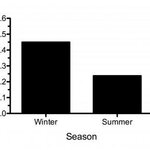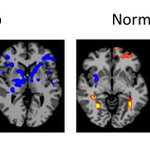Neuroscience

Musical cartoons can boost verbal intelligence? We'll hiatus Science 2.0 and start watching "Phineas&Ferb" right now.
Researchers writing in Psychological Science say pre-schoolers improved their skill after only 20 days of classroom instruction using their interactive, music-based cognitive training cartoons.
In the study, 48 pre-schoolers (four to six years of age ) participated in computer-based, cognitive training programs that were projected on a large classroom wall and featured cartoon characters delivering the lessons. The children were divided into two groups. One…

Researchers recently monitored the behavior of thousands of people as they sang along to more than a thousand tunes and say they have uncovered the common traits in songs that are most 'catchy'.
That's right. If you like to song along to some songs more than others, there is a sort-of science reason why; it helps to be a man, though ironically with a higher-pitched voice.
The four core elements that trigger people's inclination to sing, according to musicologist Dr. Alisun Pawley and psychologist Dr. Daniel Mullensiefen are:
1) Longer and detailed musical phrases. The breath a vocalist takes…

After a thorough two-year investigation, researchers at UC San Diego and the University of Oregon have identified over 70 genes that play a role in the repair of neurons after injury, specifically when it comes to the growth of axons. A massive genetic screening of 654 genes suspected to be involved, resulted in the identification of 70 genes that promote axon growth and 6 that inhibit it.
Axon growth is an important factor in recovering from nerve trauma. A spinal cord injury, or a stroke, causes a lot of damage to the axons. The severity of these injuries lies in the inefficiency of axon…

Think someone is bored if they yawn? Perhaps their brain is just overheating.
A study led by Andrew Gallup, a postdoc in Princeton University's Department of Ecology and Evolutionary Biology, says yawning frequency varies with the seasons and that people are less likely to yawn when the heat outdoors exceeds body temperature. Conclusion: yawning could serve as a method for regulating brain temperature.
The researchers documented the yawning frequency of 160 people in the winter and summer in Tucson, Arizona, with 80 people for each season. They found that participants were more…

The number of individuals who are obese and suffer with its associated health problems has continued to rise, even being called an epidemic.
Is it genetics? The dream of cheap food finally being realized? Or are we slaves to marketing?
Researchers from Yale University School of Medicine and the University of Southern California say they have visualized differences in the way that the brains of obese and non-obese individuals respond to visual cues of high-calorie foods. They see those foods differently.
The researchers found that in normal weight individuals with low levels of…

You can't read a book like the excellent Conversations on Consciousness (interviews with experts in the field of consciousness), by Susan Blackmore (not pictured above), without having some pretty wild conversations with your own consciousness. Unless you're a philosophical zombie, of course. A philosophical zombie is not, as one might think, a zombie who spends a lot of time in serious intellectual questioning about the nature of reality, it's a zombie who exists merely as a philosophical concept: a sort of litmus test of where you sit on the whole issue of dualism (that mind and…
A study on activity in a the parahippocampal cortex (PHC) found people will remember a visual scene when the brain is more active.
The PHC, which has previously been linked to recollection of visual scenes, wraps around the hippocampus, a part of the brain critical for memory formation. However, this NeuroImage study is the first to investigate how PHC activity before a scene was presented would affect how well the scene was remembered.
Subjects were shown 250 color photographs of indoor and outdoor scenes as they lay in a functional magnetic resonance imaging (fMRI) scanner. They were…

In patients with seriously altered states of consciousness, there is also the puzzle about dreaming. Do ‘vegetative’ patients (also known in clunkier, politically correct fashion as patients in a state of unresponsive wakefulness) or minimally conscious state patients experience normal sleep? Electrophysiological studies have been no help so the hypothesis is if the vegetative state opens no conscious door onto the external world, the state of minimal consciousness for its part assumes a residual consciousness of the environment, certainly fluctuating but real.
It is this…

Most of us don’t have a problem attributing emotions to primates, dogs, horses and other vertebrates. But what about invertebrates? That seems less obvious. They have smaller, less complex brains, but is that enough to boldly claim they have no emotions? Of course, studying animal emotions is a precarious business. Studying human emotions has already proven difficult enough, and in animals it is bound to be a lot harder.
One way to go about it, is to take a look at so-called cognitive biases, biases in the processing of information that are typical of negative affective states. An example of…
For the crowd watching an Illinois high school football game last fall, it was a sickening feeling watching one of their Unity High School cornerbacks collapse to the ground after delivering a heads-down tackle on an opposing running back (see video here.)
For Steven Broglio, an assistant professor of kinesiology at the University of Michigan, it was a mixed feeling of concern and curiosity as to the extent of the injury. Since 2007, Broglio has been collecting data on the violent collisions that occur in high school football and their contribution to concussions and other head…